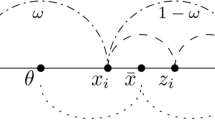Abstract
In the expert use problem, hierarchical models provide an ideal perspective for classifying understanding and generalising the aggregative algoithms suitable to compose experts' opinions in a single synthesis distribution. After suggesting to look at Peter A. Morris' (1971, 1974, 1977) Bayesian model in such a light, this paper addresses the problem of modelling the multidimensional ‘performance function’, which encodes aggregator's beliefs about each expert's assessment ability and the degree of dependence among the experts. Whenever the aggregator has not an empirically founded probability distribution for the experts' performances, the proposed fiducial procedure provides a rational and very flexible tool for enabling the performance function to be specified with a relatively small number of assessments: moreover, it warrants aggregator's beliefs about the experts in terms of personal long run frequencies.
Similar content being viewed by others
References
Agti P (1997) Stime fiduciali di probabilìtà incognite. StatisticaLVII (3), 383–396
Agati P (1998) Stime fiduciali di probabilità nell'aggregazione bayesiana di informazioni. StatisticaLVIII (4), 655–668
Aitchison J, Brown JAC (1973) The lognormal distribution. Cambridge University Press, Cambridge
Buehler, RJ (1980) Fiducial inference. In Fienberg SE, Hinkley DV (eds.) R.A. Fisher: an appreciation. Springer, Berlin Heidelberg New York
Clemen, RT (1986) Calibration and the aggregation of probabilities. Management Science32, 312–314
Clemen, RT, Fisher GW, Winkler RL (2000) Assessing dependence: some experimental results. Management Science46, 1100–1115
Clemen, RT, Winkler RL (1985) Limits for the precision and value of information from dependent sources. Operation Research33, 427–442
Clemen, RT, Winkler RL (1990) Unanimity and compromise among probability forecasters. Management Science36: 767–779
Clemen, RT, Winkler RL (1993) Aggregating point estimates. A flexible modeling approach. Management Science39, 501–515
Clemen, RT, Winkler RL (1999) Combining probability distributions from experts in risk analysis. Risk Analysis19, 187–203
Cooke RM (1991) Experts in uncertainty. Opinion and subjective probability in science. Oxford University Press, Oxford
Dawid AP (1982) The well-calibrated Bayesian. Journal of the American Statistical Association77, 605–613
De Finetti B (1937) La prévision: ses lois logiques, ses sources subjectives. Annals de l'Institute Henry Poincaré7, 1–60 [Translated: (1963) Foresight: its logical laws, its subjective sources. In: Kyburg, Smokler (eds.) Studies in subjective probability, pp. 97–158, Wiley, New York]
De Finetti B (1954) Media di decisioni e media di opinioni. Bulletin of the International Statistical InstituteXXXIV, 1–14
Fisher RA (1930) Inverse probability. Proceedings of the Cambridge Philosophical Society26, 528–535
Fisher RA (1935) The fiducial argument in statistical inference. Annals of Eugenics6, 391–398
Fisher RA (1956, second edition 1959) Statistical methods and scientific inference. Oliver & Boyd, Edinburgh
Fisher RA (1957) The underworld of probability. Sankhya18, 201–210
Freeling ANS (1981) Reconciliation of multiple probability assessments. Organizational behavior and human performance28, 395–414
French S (1980) Updating of belief in the light of someone else's opinion. Journal of the Royal Statistical Society A143, 43–48
French S (1985) Group consensus probability distributions: a critical survey. In: Bernardo JM et al., (eds.) Bayesian statistics 2, pp. 183–201., Elsevier Science Publishers B.V., North-Holland, Amsterdam
French S (1986) Calibration and the expert problem. Management Science32, 315–321
Gelfand AE, Mallick BK, Dey DK (1995) Modeling expert opinion rising as a partial probabilistic specification Journal of American Statistical Association90, 598–604
Genest C, Schervish MJ (1985) Modeling expert judgments for Bayesian updating. Annals of Statistics13, 1198–1212
Genest, C., Zidek, JV (1986) Combining probability distributions: a critique and an annotated bibliography. Statistical Science,1, 114–148
Gokhale DV, Press SJ (1982) Assessment of a prior distribution for the correlation coefficient in a bivariate normal distribution. Journal of the Royal Statistical Society A145, 237–249
Kalbfleisch JG (1979) Probability and statistical inference, vol.I. Springer, Berlin Heidelberg New York
Lindley DV (1982) The improvement of probability judgements. Journal of the Royal Statistical Society A145, 117–126
Lindley DV (1983) Reconciliation of probability distributions. Operations Research,31, 866–880
Lindley DV (1985) Reconciliation of discrete probability distributions. In: Bernardo JM et al. (eds.) Bayesian statistics 2, pp. 375–390. Elsevier Science Publishers B. V., North-Holland, Amsterdam
Lindley DV (1986) Another look at an axiomatic approach to expert resolution. Management Science32, 303–306
Lindley DV (1990) The 1988 Wald Memorial Lectures: the present position in Bayesian statistics. Statistical Science5, 44–89
Lindley DV, Tversky A, Brown RV (1979) On the reconciliation of probability assessments. Journal of the Royal Statistical Society A142, 146–180
Morris CN, Normand SL (1992) Hierarchical models for combining information and for meta-analyses. In: Bernardo JM et al. (eds.) Bayesian statistics 4, pp. 321–344. Oxford University Press, Oxford
Morris PA (1971) Bayesian expert resolution. Ph.D. Dissertation, Department of Engineering-Economic Systems, Stanford University
Morris PA (1974) Decision analysis expert use. Management Science20, 1233–1241
Morris PA (1977) Combining expert judgements: a Bayesian approach. Management Science23, 679–693
Morris PA (1983) An axiomatic approach to expert resolution. Management Science29, 24–32
Morris PA (1986) Observations on expert resolution. Management Science32, 321–328
Spiegelhalter DJ, Cowell RG (1992) Learning in probabilistic expert systems. In: Bernardo JM et al. (eds.) Bayesian statistics 4, pp. 447–465. Oxford University Press, Oxford
Winkler RL, (1981) Combining probability distributions from dependent information sources. Management Science27, 479–488
Winkler RL (1986) Expert resolution. Management Science32, 298–303
Winkler RL, Clemen RT (1992) Sensitivity of weights in combining forecasts. Operations Research40, 609–614
Wright G, Ayton P (1987) Judsemental forecasting. Wiley & Sons, New York
Author information
Authors and Affiliations
Additional information
Research supported by COFIN-99 grants.
Rights and permissions
About this article
Cite this article
Monari, P., Agati, P. Fiducial inference in combining expert judgements. Statistical Methods & Applications 10, 81–97 (2001). https://doi.org/10.1007/BF02511641
Issue Date:
DOI: https://doi.org/10.1007/BF02511641




